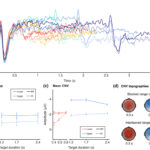Subjective time perception fluctuates with a stimulus’s valence and expectancy. Karaaslan and Shi’s (2024) research examined how temporal and probabilistic expectancies affect the duration perception of emotionally varied images. The first experiment adjusted temporal cues through different stimulus-onset asynchronies (SOAs), and the second altered cue-emotion probability associations. Their findings indicated that earlier-than-expected stimuli were perceived as briefer, and rarer stimuli as more prolonged. Negative images seemed to endure longer than neutral ones. However, they found no significant interaction between expectancy and valence, implying emotional stimuli alter the pacemaker’s rhythm via arousal, while expectation modulates attention, thereby affecting temporal perception.
This study has been published in the Quarterly Journal of Experimental Psychology.
Karaaslan, A., & Shi, Z. (2024). EXPRESS: Influences of Temporal and Probabilistic Expectation on Subjective Time of Emotional Stimulus. The Quarterly Journal of Experimental Psychology, 17470218241245355. https://doi.org/10.1177/17470218241245355




